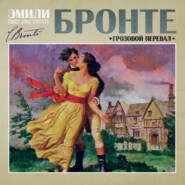По всем вопросам обращайтесь на: info@litportal.ru
(©) 2003-2025.
✖
Сборник лучших произведений английской классической литературы. Уровень 3
Настройки чтения
Размер шрифта
Высота строк
Поля
“Good-bye, Mr. Brocklehurst.”
Mrs. Reed and I were left alone: some minutes passed in silence; she was sewing, I was watching her with rage in my eyes. Mrs. Reed looked up from her work
“Return to the nursery,” she ordered with irritation. But first I wanted to talk with her.
“I am not deceitful,” I said. “If I were, I would lie and say I love you, and I declare I do not love you. I dislike you, and your son, and the girls. They tell lies, not me.”
“Have you anything more to add?” she asked coldly, as if she were speaking to an adult, not a child[10 - as if she were speaking to an adult, not a child – словно она говорила со взрослым человеком, а не с ребёнком]. Shaking from head to foot, I continued: “I am glad you are no relation of mine. I will never call you aunt again as long as I live. People think you a good woman, but you are bad, hard-hearted. YOU are deceitful!”
“'Jane, you are under a mistake: what is the matter with you? I assure you, I desire to be your friend.”
“Not you. You told Mr. Brocklehurst I had a bad and deceitful character; and I'll let everybody at Lowood know what you are, and what you have done. Send me to school soon, Mrs. Reed, for I hate to live here.”
“I will indeed send her to school soon,” murmured Mrs. Reed and left the room. I won.
“All at once I heard a clear voice call, 'Miss Jane! where are you? Come to lunch!”
It was Bessie, I knew well enough, but I did not move. She came and her presence seemed cheerful. I put my two arms round her.
“You are going to school, I suppose?” she asked.
I nodded.
“And won't you be sorry to leave poor Bessie?”
“Not at all, Bessie; indeed, I'm rather sorry.”
She laughed at my words and we embraced.
Chapter 4
At five o'clock in the morning Bessie came into my room to find me already up and dressed. She prepared breakfast for me, but few children can eat when excited with the thoughts of journey.
As we passed Mrs. Reed's bedroom, she said, “Will you go in and bid Missis goodbye?” I just shook my head.
“Good-bye to Gateshead!” cried I, as we passed through the hall and went out at the front door.
The winter morning was raw and chill. At the lodge house, the porter's wife was up; I could already hear the sound of the public coach coming towards us in the distance.
“Is she going by herself?” asked the porter's wife.
“Yes, fifty miles, all on her own,” said Bessie.
The coach came into view, and the horses stopped. My trunk was taken from me and put up onto the roof. I embraced Bessie, and she kissed me on the cheek.
“Be sure to take good care of her!” said she, as I was put in the carriage and the wheels began to move. I was carried away to my new life.
I remember little of the journey. The day seemed too long took all day, we stopped at the inn once but I had no appetite. I was feeling very strange. We were getting very far from Gateshead, to a remote and mysterious place. The wind started to rush amongst trees; and lulled by the sound, I at last fell asleep.
I woke up when the carriage stopped. The door was opened, and I saw a servant standing in the rain.
“Is there a little girl called Jane Eyre here?” she asked. I said “yes”. The guard lifted me out, my trunk was put down, and seconds later the coach drove away.
I was exhausted after a long journey and chilled to the bone as rain, wind, and darkness filled the air. I could see a house or houses with many windows, and lights burning in some. The servant led me inside it and left me in a silent room by the fire.
As I looked round warming my fingers and trying to make out what was there in the room, two ladies came in. The first one was a tall lady with dark hair, dark eyes, a pale and large forehead, and a figure partly enveloped in a shawl[11 - partly enveloped in a shawl – частично укрытая шалью]. She was about twenty-nine and looked a little older than the second lady.
“The child looks tired,” said the first lady. “She should be put to bed soon, Miss Miller. And she must be hungry. Let her have supper.” Then she addressed me, “Is this the first time you have left your parents to come to school, my little girl?”
“I have no parents.”
I told her my age, my name and whether I could read, write, and sew. She seemed pleased. She touched my cheek gently and dismissed me with Miss Miller.
Led by her, I passed from passage to passage till we entered a wide, long room, with great tables, two at each end, and girls of every age, from nine up to eighteen, sitting around them on benches. Countless and similar figures, they were whispering repetitions for tomorrow's classes and their whispers grew into a hum of voices.
I was told to sit on a bench near the door, and Miss Miller walked up to the top of the long room.
“Monitors, collect the books and put them away! Then fetch the supper-trays!” Immediately four older girls got up, gathered the books, went out and returned, each carrying a tray with a pitcher of water, a mug and portions on them. The portions were handed round. Those who liked took the mug and poured water. I was thirsty, but did not touch the food as I was still too excited and tired to eat.
When the meal was over, Miss Miller read prayers, and the classes went upstairs, two by two. By now I was so exhausted, I hardly noticed what the bedroom was like, I only saw it was very long. I was helped to undress and put into bed. In ten minutes the light was switched off, and I fell asleep.
Chapter 5
The night passed rapidly. When I opened my eyes, a loud bell was ringing and girls were up and dressing all around me. It was still dark and freezing cold in the bedroom. I dressed shivering and waited for my turn at the basin. But I had hardly begun to wash my face when the bell rang again. All formed in file, two and two, we descended the stairs and entered the cold and dimly lit schoolroom. After prayers Miss Miller told us to form classes.
There were four classes, and Miss Miller put me in the one with the smallest of the children. We said prayers and read from the Bible for an hour. As I had not eaten since my departure from Gateshead, looked forward to our breakfast.
At the sound of the breakfast bell, we formed into pairs again to go to the refectory, a gloomy room, furnished with two long tables. Basins of something steaming hot stood on every table though the odour was far from inviting. The tall girls at the front murmured that the porridge had been burnt again.
“Silence,” snapped one of the teachers, a short woman with a sour face. We took our places. A long grace was said and a hymn sung; then a servant brought in some tea for the teachers, and the meal began. I was so hungry that I swallowed several mouthfuls before the revolting, gluey taste of the burned porridge made me stop. I saw each girl taste her food and try in vain to swallow. Breakfast was over, and none had breakfasted. I was one of the last to go out, and in passing the tables, I saw one teacher take a basin of the porridge, taste it and call it 'disgusting'.
We spent a quarter of an hour in a schoolroom, where mostly all conversations were held on the subject of the breakfast. A clock in the schoolroom struck nine. “Silence!” cried Miss Miller, and the conversations ceased. Ranged on benches down the sides of the room, the eighty girls sat motionless, all in brown dresses and all with plain locks combed from their faces, not a curl visible. Miss Miller ordered the monitors to fetch the globes for a geography lesson. But before we started, the dark-haired lady, who had been so kind to me the previous day, entered the room.
She walked up and down the benches inspecting us. I stared at her in awe admiring how tall, beautiful and graceful she was.
As she came to the middle of the room, and stood before us to make an announcement. “You had a breakfast this morning which you could not eat,” she said. “You must be hungry. I have ordered a lunch of bread and cheese to be served to all.”
The teachers looked at her with surprise.
“I will take full responsibility,” she added. And so the delicious fresh bread and cheese was brought in to the high delight of the whole school.
The order was now given 'To the garden!'
Outdoors there was a wide square garden surrounded by high walls. A verandah ran along it framed by broad walks. There were also cultivation beds, where in the summer we would grow flowers and vegetables. But at the end of January they were brown and bare. There was a drizzling yellow fog and most pupils huddled in groups to stay warm, only few stronger girls engaged in active games. I saw how pale the children were and heard many of them cough.
I stood lonely, as I had not spoken to anyone. No one took notice of me, and I was accustomed to isolation. I hardly yet knew where I was; Gateshead and my past life seemed long forgotten. I looked round the garden, and then up at the house-a large building, half of which seemed grey and old, the other half quite new. I saw that it had an inscription above the door:
“'Lowood Institution.-

















